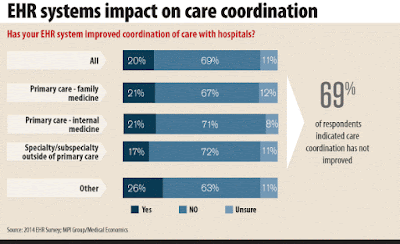- Office-based cardiologists have the highest rate of EHR adoption, at 95.6%, followed by neurologists, at 94.5%, according to the Centers for Disease Control and Prevention’s National Electronic Health Records Adoption Survey.
- Urologists, who rank third for EHR use at 94%, have the highest percentage of certified systems of any medical specialty — 92.6%.
- Other areas with strong adoption rates are general surgery (93.8%), orthopedic surgery (93.2%) and general/family practice (92.7%). Psychiatrists are the least likely to use EHRs, with just 61.3% saying they have a system.
Overall, 86.9% of office-based physicians in the U.S. use some form of EHR. State by state, usage rates range from a high of 98.8% in Delaware to 74.8% in Louisiana, the report shows. In all, 19 states had physician use rates of 90% or above.
The survey reflects the growing role that EHRs play in health care today. According to a survey released last summer by the Office of the National Coordinator for Health IT, 96% of nonfederal acute care hospitals had a certified EHR system in 2015, and 84% had at least basic EHR technology. The survey also showed that eight in 10 small, rural and critical access hospitals are using EHRs. As in the office-based setting, psychiatric hospitals have among the lowest adoption rates — 55% versus 84% for general hospitals.
Studies have linked EHRs to increasing rates of physician burnout in this country. A study published in the Annals of Internal Medicine found that doctors spend roughly half (49.2%) of their workday on EHR and administrative tasks, versus 27% seeing patients.
Physicians' satisfaction with electronic health record (EHR) systems has declined by nearly 30 percentage points over the last five years, according to a survey released this week.
Heart docs, neurologists lead specialists in EHR adoption | Health care Dive



No comments:
Post a Comment